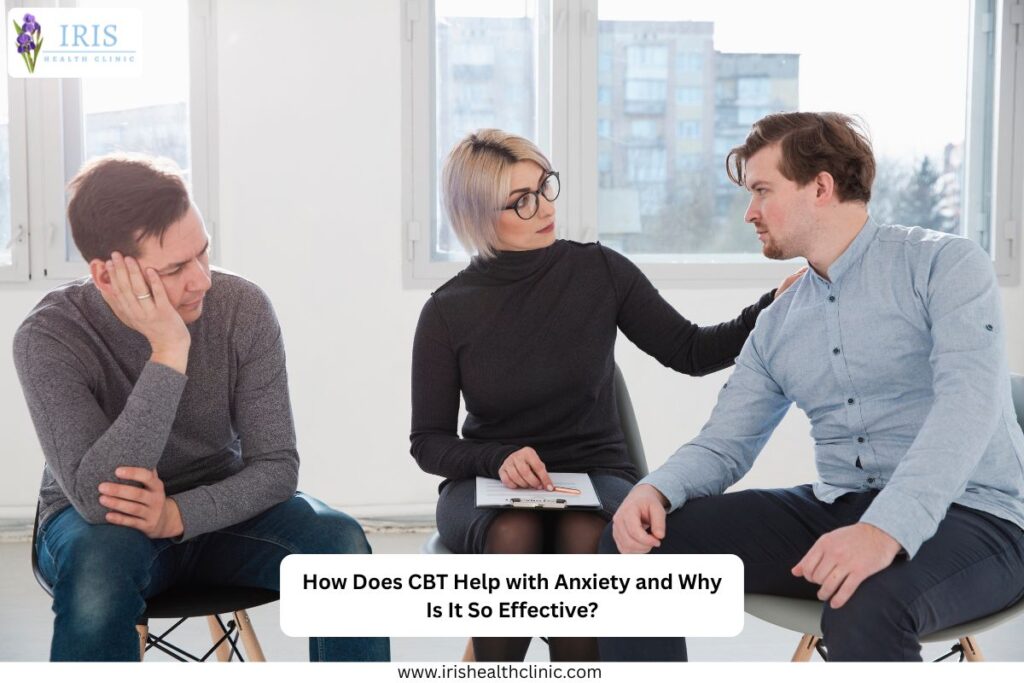Anxiety can be very difficult to deal with and it can cause a wide range of symptoms, such as overthinking and worrying all the time to experiencing physical effects like heart pounding or restlessness. Iris Health Clinic understands the profound impact that anxiety can have on an individual’s mental and emotional well-being. That is why we highly recommend Cognitive Behavioral Therapy (CBT) to our people who are treating anxiety. But what do therapists involve in treating anxiety with CBT, and why do experts consider it one of the most modern and effective treatment approaches in mental health care?
What Is Cognitive Behavioral Therapy (CBT)?
Cognitive Behavioral Therapy (CBT) is a systematic and scientifically supported type of psychotherapy that helps patients find and correct their negative thinking and behavior patterns. CBT does not just work with the thoughts and feelings but also actions—this leads the person to break the circle of anxiety, fear and avoidance.
Iris Health Clinic has CBT specialists who will be with you during your learning process and they will help you to see how your ways of thinking affect your feelings and actions. The process is gradual and CBT will provide you with the tools to change your thoughts to be more balanced and realistic.
How Does CBT Help with Anxiety?
CBT for anxiety refers to the cause which is unhelpful thinking patterns that lead to feelings of anxiety and avoidance as the main issue. It does not merely control the symptoms; it shows you how to handle your thoughts and emotions in a more positive and healthy way.
CBT is a great therapy option for anxiety individuals and here are the steps that lead patients to the light at the end of the tunnel:
- Identifying negative thought patterns – Acknowledge fear-based thoughts that automatically come to mind and aggravate anxiety.
- Challenging irrational beliefs – Get trained in questioning and changing warped thoughts into realistic and rational ones.
- Developing coping strategies – Tools for effective management of panic, worry, and stress will be provided to you.
- Increase exposure and desensitization – The fear will be confronted gradually in a safe and controlled environment, diminishing the avoidance.
- Enhancing emotional regulation: Mindfulness and self-observation will strengthen resilience and help regulate the nervous system.
Why Is CBT So Effective for Anxiety?
There are a few reasons CBT enjoys a reputation as the most compelling therapy for anxiety when compared to other therapies.
- It is evidence-based practice – Clinically effective for both anxiety and depression, decades of scientific research has supported this therapy.
- Well-organized, goal-oriented therapy – This specific kind of therapy allows you to take gradual small steps and measurable change in your progress backs it.
- Skill Utilization: Individualself teaches the use of tool they can utilize for copings skills for a life-time.
- Personalized Treatment – They tailor it to the specific cognitive and affective patterns of the individual.
- Focuses on the contemporary – Works on present-day problems rather than being stuck for too long from the past.

CBT for Depression and Other Mental Health Conditions
CBT therapy for anxiety is very effective but it is also one of the pillar therapies for treating clinical depression. A lot of individuals have both anxiety and depression, and cognitive behavior therapy for depression allows them to fight off despair, and boost up their, willpower, as well as, cultivate good habits.
Moreover, CBT is a comprehensive approach to mental health that includes:
- CBT for health anxiety (fear of being sick or having bodily symptoms)
- Cognitive therapy for all types of anxiety disorders (such as panic disorder, social anxiety, or phobias)
- CBT for clinical depression and mood control
Benefits of CBT for Anxiety
- Better emotional consciousness
- Lessened occurrences of panic attacks and physical symptoms
- Increased self-assurance in coping with pressure
- Better communication and relationships
- Resilience over the long term with prevention of relapse
Frequently Asked Questions
- How long is the period needed for CBT to show its effect on anxiety?
The majority of the people notice changes in approximately 6 to 12 sessions; however, the intensity of the symptoms and how well the individual commits to practicing CBT techniques in the intervals affect this.
2. Is it possible to combine CBT with medication?
Indeed, a lot of clients derive the maximum benefit from getting both CBT and the prescribed medication for anxiety or depression. At Iris Health Clinic, our psychiatrists and therapists work together to provide full-spectrum treatment.
3. Is CBT used for all types of anxiety disorders?
This approach to therapy demonstrates effectiveness in treating generalized anxiety disorder (GAD), panic disorder, social anxiety, phobias, and health anxiety.
4. How is CBT different from other therapists
CBT is different from some therapists that emphasize the past, on the contrary, CBT invests more in the patient in the present thinking and doing, which helps to make it a practical, quick, and results-driven approach.
5. Can I do CBT skills in my home?
Yes, absolutely! Homework reasonings like journaling, keeping thought records and engaging in exposure exercise actually represent the parts of CBT that will allow you to rehearse and reinforce the skills you are learning in the sessions.
Conclusion
We at Iris Health Clinic contend that the elimination of anxiety symptoms is not the sole purpose of therapy; rather it is the empowerment of clients with the methods to lead a confident and tranquil life that is the main purpose. CBT for anxiety and cognitive behavioral therapy for depression are two avenues that lead to emotional freedom and mental toughness respectively.
Should you or someone close to you be unable to manage anxiety or depression, please contact Iris Health Clinic without delay. Our caring staff will show you the way CBT can positively impact your mental health and life quality.

